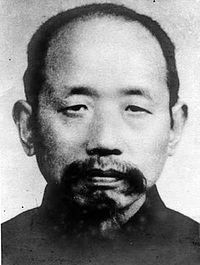Views
m |
m |
||
| (2 intermediate revisions not shown) | |||
| Line 1: | Line 1: | ||
{{Bio_infobox | {{Bio_infobox | ||
| - | |name-date=Wáng Ēnyáng 王恩洋 ( | + | |name-date=Wáng Ēnyáng 王恩洋 (1897-1964) |
|names=* Courtesy name 字: Huàzhōng 化中 | |names=* Courtesy name 字: Huàzhōng 化中 | ||
|image=[[File:Wang_enyang.jpg|200px|center|Wáng Ēnyáng]] | |image=[[File:Wang_enyang.jpg|200px|center|Wáng Ēnyáng]] | ||
| Line 10: | Line 10: | ||
}} | }} | ||
| - | '''Wáng Ēnyáng 王恩洋 ( | + | '''Wáng Ēnyáng 王恩洋 (1897-1964)''' was a student and professor of Buddhist philosophy, especially Dharmalakṣaṇa and Consciousness-Only 法相[[唯識]]. |
==Biography== | ==Biography== | ||
Current revision as of 09:33, 31 December 2010
Wáng Ēnyáng 王恩洋 (1897-1964)
|
Notable Associates:
|
|
Wáng Ēnyáng 王恩洋 (1897-1964) was a student and professor of Buddhist philosophy, especially Dharmalakṣaṇa and Consciousness-Only 法相唯識.
Biography
In 1919 Wáng studied Indian philosophy at Beijing University. In 1922 he went to Nánjīng to study Dharmalakṣaṇa and Consciousness-Only under Ōuyáng Jiàn 歐陽漸 at his Chinese Inner Studies Institute 支那內學院. Wáng later took a teaching position at the school and helped Ōuyáng transform the Institute in July of 1925 into Dharmalakṣaṇa University 法相大學. Wáng worked as the head of education at the university and lectured on Dharmalakṣaṇa. The school stopped operation in 1926 when the National Revolutionary Army 國民革命軍 entered Nánjīng 南京 during the Northern Expedition.
In 1927 Wáng returned to his hometown of Nánchōng to establish Guīshān University 龜山書院 which accepted both lay and monastic students. It operated for 12 years but was forced to close in December of 1941 when its funding dried up as a result of the Pacific War. In 1942 he established the Eastern Culture and Education Research Center 東方文教研究院 at Shèngshuǐ Temple 聖水寺 in Nèijiāng 內江, Sìchuān. He published a book series entitled "Eastern Culture and Education" 東方文教叢書 and the magazine Culture and Education 文教叢刊.
After the establishment of the PRC, he served in various official positions before returning to Chéngdū in 1961 because of illness. He died in 1964. Over his lifetime he wrote more than 200 works on Buddhist and other subjects.
Important Works
- 摄大乘論疏
- 唯識通論
- 心經通释
- 佛學通論
- 人生學
- 人生哲學與佛學
- 起信論料簡
References
- Shì Dōngchū 釋東初. Zhōngguó Fójiào jìndài shǐ 中國佛教近代史 (A History of Early Contemporary Chinese Buddhism), in Dōngchū lǎorén quánjí 東初老人全集 (Complete Collection of Old Man Dongchu), vols. 1-2. Taipei: Dongchu, 1974 Pp. 2.676-679.
- Yú Língbō 于凌波. Zhōngguó jìnxiàndài fójiào rénwù zhì 中國近現代佛教人物志. Běijīng 北京: Zōngjiào wénhuà chūbǎnshè 宗教文化出版社, 1995. Pp. 601-606.
- Yú Língbō 于凌波, ed. Xiàndài Fójiào rénwù cídiǎn 現代佛教人物辭典 (A Dictionary of Modern Buddhist Persons), 2 vols. Taipei: Foguang, 2004. Pp. 1.175b-179b.
- 王恩洋在内江圣水寺
